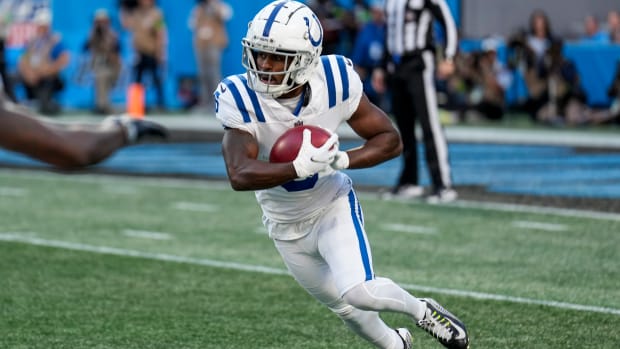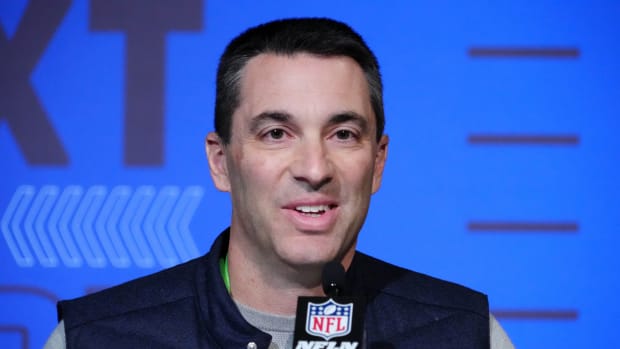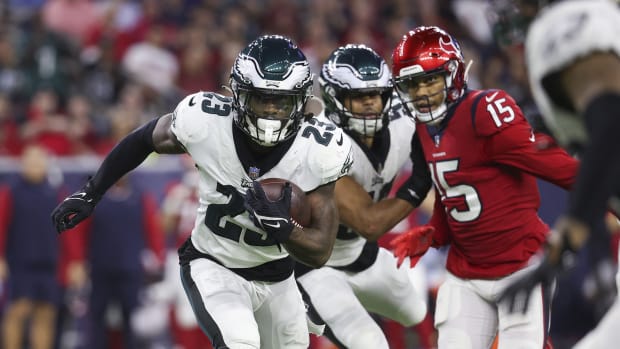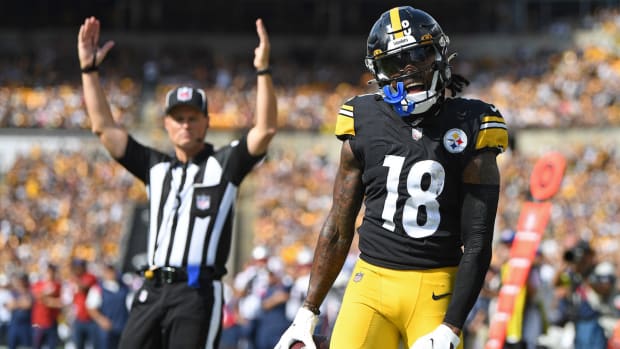NFL Overtime Should Give First Possession to the Team With the Most Total Net Yards
Welcome to Bad Takes Week, where MMQB staffers have been asked to expand upon some of their worst football takes. These are columns on the ideas they believe in strongly, even if it makes the rest of the room groan during our pitch meetings. Keep an eye out for more of these throughout the week.
For years the NFL has tweaked its rules to favor the offense. Teams are more incentivized than ever to invest in a franchise QB, and yet we just saw the Chiefs lose the AFC Championship Game in overtimewithout even getting to put theirs on the field.
But instead of changing the rule to simply give each team an overtime possession—which, with the relatively new 10-minute regular season overtime period, would result in a greater likelihood of a tie—why not just give first possession to whichever team has racked up the most total yards? (Or, even better, the most total net yards, totaling yards from scrimmage and return yards, and subtracting penalty yardage.)
It was Voltaire who said “perfect is the enemy of good.” Is giving the first overtime possession to the team with the highest total net yardage a perfect solution? Of course not. But is it a GOOD solution? Compared to a coin toss—absolutely. At least yardage relates to what happened in the game. Yards are earned. Good offenses gain them, good defenses prevent them. They’re not, like a coin toss, completely random.
Think of the strategic implications of determining OT possession by this method. Currently, a, say, 3rd-and-18 scenario in the NFL likely plays out like this: The defense goes soft, the offense gladly dumps off a short pass to the running back, he scampers 12 or 15 yards and then there’s a punt. But if yardage decided overtime possession, that 3rd-and-18 would encourage the defense to play firmer. The offense, knowing this and knowing that yards count, might be more aggressive. And now we’re talking about a meaningful football play with immediate—and, indirectly, delayed—ramifications.
End-of-half Hail Marys also present a fascinating dilemma: Does the offense heave the super-low-percentage throw for a chance at six points? Or does that offense aim to just gain, say, an extra 20 yards as time expires? Remember, the defense also has a decision: Defend the Hail Mary and give up the yardage, or defend the field and risk getting beat on a deep heave over the top. However it shakes out, what’s likely NOT happening is a good-for-nothing kneel-down.
Making yards count could also encourage more teams to play hurry-up, which often gives fans a more enjoyable viewing experience. Going for it on fourth down becomes a little more enticing, since mounting long drives take on a slightly added significance. And, increasing the value of yards plays to the fantasy football crowd, which is how the NFL captures many casual viewers. And again, remember, all we’re giving up in this deal is an arbitrary coin toss!
The counters to this idea are predictable: sometimes yardage can be misleading, and the team with the most yards isn’t necessarily the team that played the best. And that’s true—except that most of the opportunities for misleading yards come in the scenarios covered above: end-of-half plays and long third downs. Or they come in garbage time, but that’s irrelevant in an overtime discussion.
Yeah, but what about turnovers, you say? If a team forces a lot of turnovers, it gets shorter fields, which means fewer opportunity to accumulate yardage. And any defensive or special teams return score would take away an entire possession, essentially punishing you for creating a turnover. It's a valid point. Though many games where a turnover disparity has a significant impact are not tied at the end, of the NFL's 79 overtime games in the last five years, the game-by-game statistical data suggests there could be as many as 27 instances where a team loses overtime possession thanks to having forced turnovers. That's too many. So, a solution? Add defensive return yards off turnovers to our package, making total net yards the sum of yards gained on offense, special teams and defensive returns, minus penalties.
Another possible counter argument: If the game is tied in the final minutes and there’s a long field to go, and the team with the ball already has more total yards, that team might choose to kneel down the rest of regulation and play for OT. But the reverse can also be true: If a team is behind in total yards, kneeling down and playing for OT becomes almost out of the question. And imagine this [albeit unlikely] scenario: The game is tied, there is time for one last play, the team with the ball is at the opponent’s 40-yard-line and is behind in the total net yardage column by five yards. Does that head coach go for a 57-yard game-winning field goal, or does he try to gain six yards on that last play to obtain the first overtime possession? Decisions, decisions.
Or imagine an offense backed up at its own 10 with just seconds left in regulation and trailing just slightly in the yardage differential. Instead of kneeling and going to overtime, they’d fight for yards before going to overtime.
The only reason overtime possession is decided by a coin toss is because that’s how it’s always been done. But it was a foolish original idea because it determined the game’s most critical possession entirely by chance. If the coin toss were not already part of football, no one would ever think to make it the determinant for first overtime possession. It’s like cigarettes: if they’d never existed and were invented today, no politician would even consider allowing people to smoke on city streets and ruin the air for everyone within a 20-yard radius. Cigarettes are only tolerated because, well, they’ve always been tolerated. They’re still awful. Just like an overtime coin toss.
• Question or comment? Email us at talkback@themmqb.com. We are also accepting Bad Takes from our readers. If you've got one, feel free to write it up and send it in for possible publication.




































